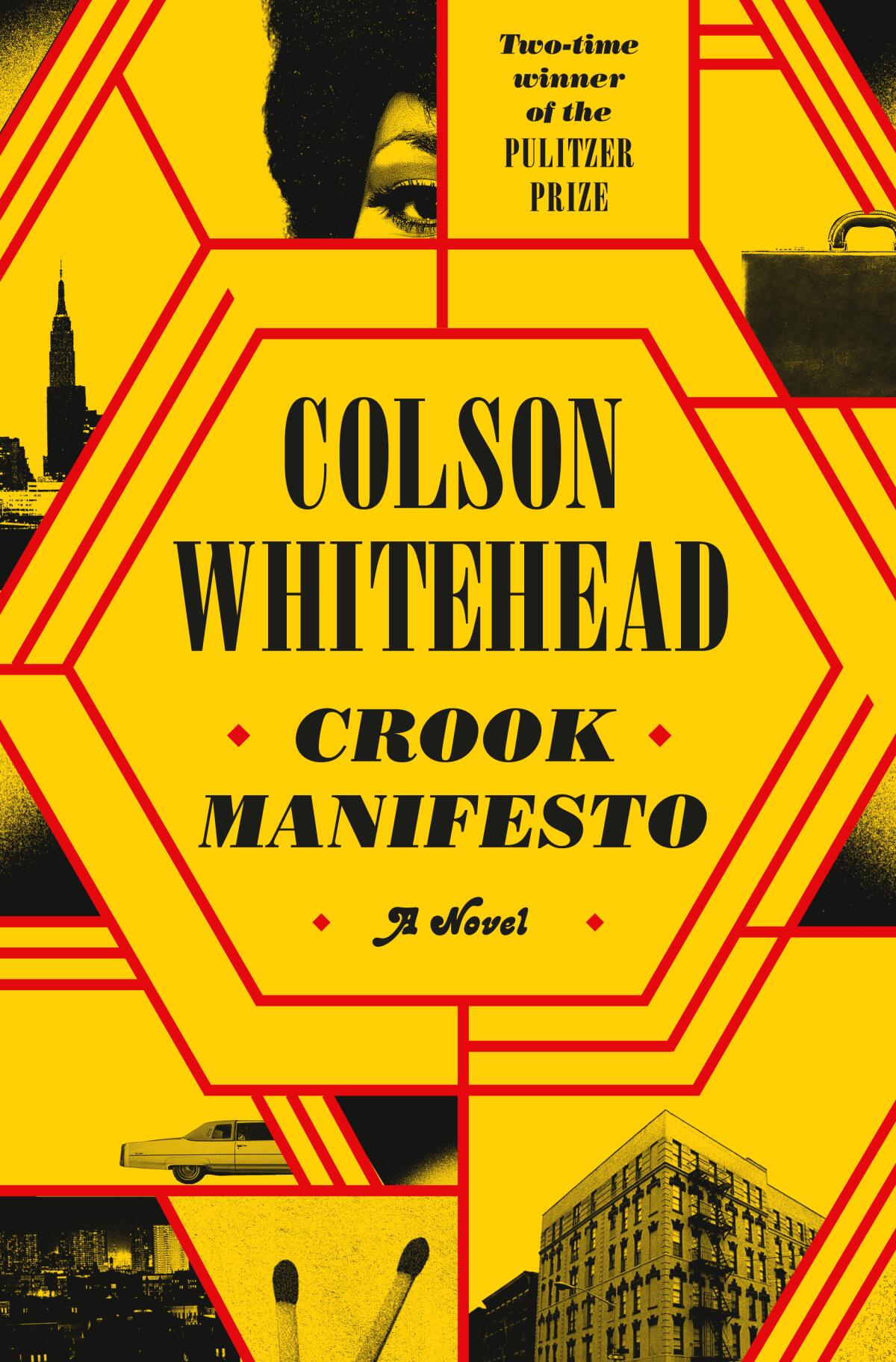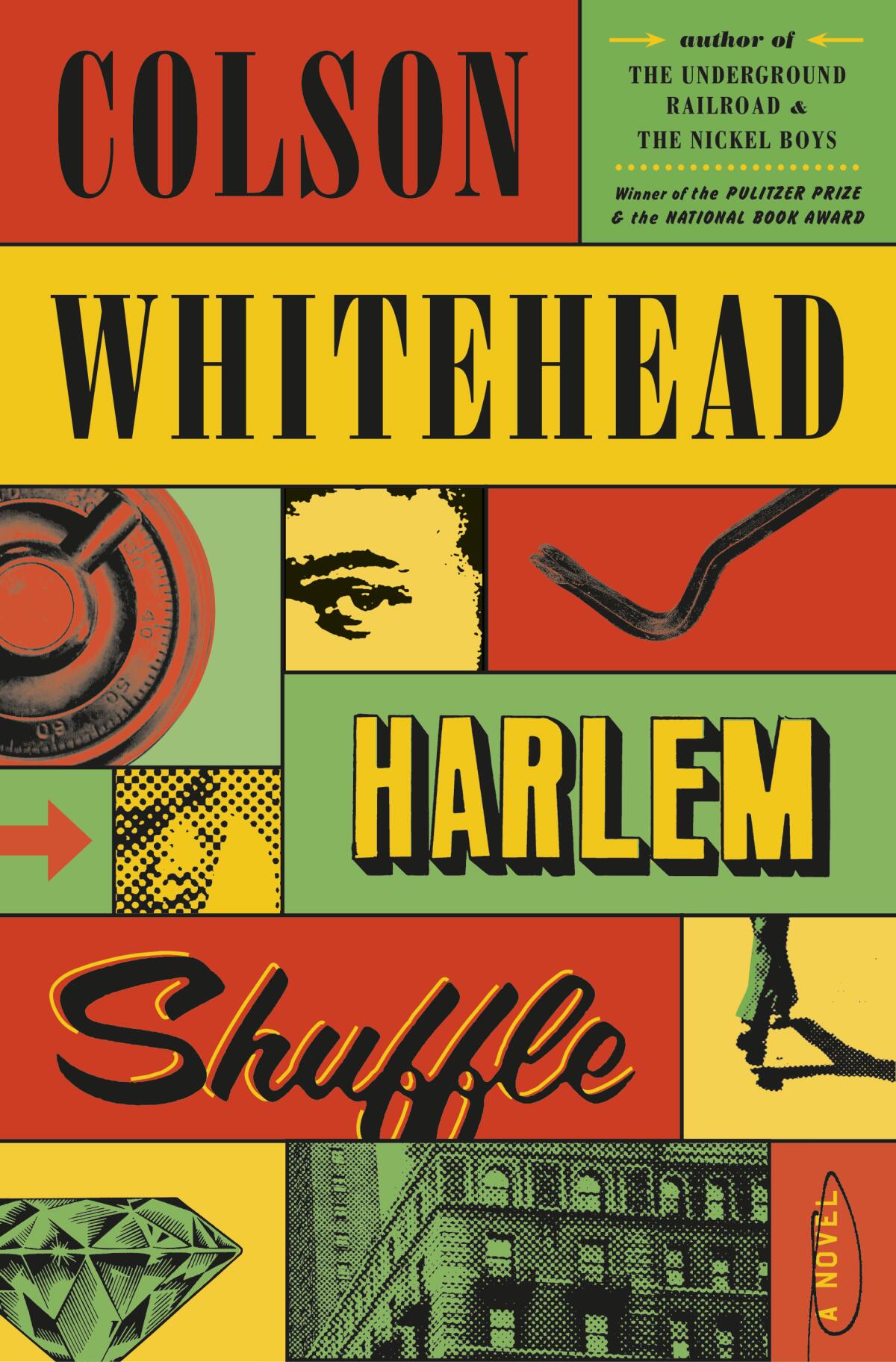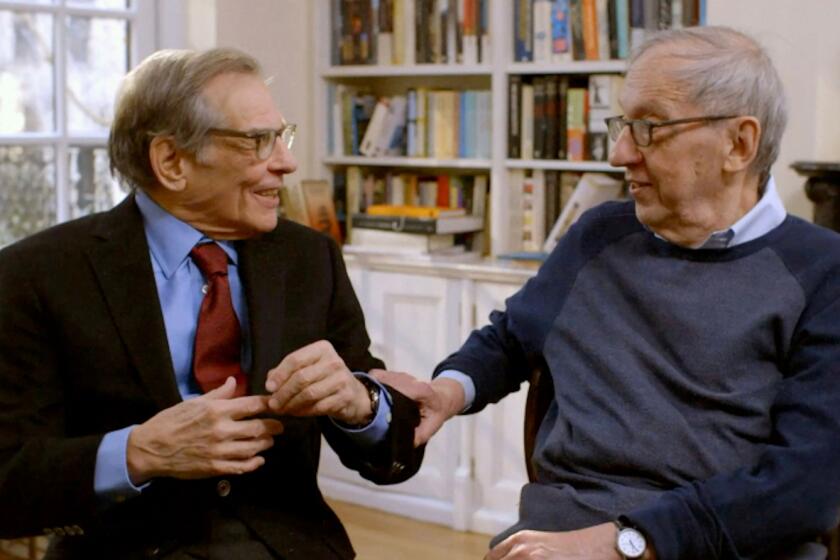Another first from shape-shifting Colson Whitehead: A crime-novel sequel

- Share via
Review
Crook Manifesto
By Colson Whitehead
Doubleday: 336 pages, $29
If you buy books linked on our site, The Times may earn a commission from Bookshop.org, whose fees support independent bookstores.
You’re Colson Whitehead, and you’ve just pocketed a couple of Pulitzers for harrowing novels — “The Underground Railroad” and “The Nickel Boys” — that wrung beauty from the abyss of America’s racist past. You’re also a historically versatile novelist, and your changeup is as devastating as your fastball. Perhaps it’s time to play in another genre. Say, the crime novel.
Whitehead’s “Crook Manifesto” arrives on the thieving heels of his 2021 “Harlem Shuffle,” and features many of the same characters. Like its predecessor, “Manifesto” is both deceptively substantive and sneakily funny, a wise journey through Harlem days and nights as lived by Ray Carney, a conscientious furniture salesman and family man who happens to run a little crooked.
Carney comes by his criminality honestly; his dad, the late Big Mike Carney, was a notorious hood in his day, always good for a heist, an arson job or a beating (like Whitehead, he was versatile). His son cowered in fear of his father throughout his childhood, but as an adult he’s been running a profitable fencing operation for years, and he has a determined if sometimes misguided thirst for vengeance and justice. He has one foot in each world, which proves to be the essence of his literary richness. As he puts it near the beginning of the new book, when he reenters the shady world after a four-year absence, “Crooked stays crooked and bent hates straight. The rest is survival.”
He wrote across many genres, then won two Pulitzers for historical fiction. In “Harlem Shuffle,” Colson Whitehead veers into thrilling crime fiction.
As it happens, Carney’s crime relapse stems from a pure enough motive. His daughter is dying to get tickets for the upcoming Jackson 5 show at Madison Square Garden. “Busy boys, the Jackson 5,” Carney muses. “He didn’t know if they were sexually active, but they were certainly promiscuous, with sponsorship deals with no less than three breakfast cereals.”

The pull of Michael, Tito and the boys leads Carney back into the jewel fencing game, which in turn leads him to a comically corrupt, terrifying and pilled-up police detective named Munson, now a desperate animal hunted by the Knapp Commission — a panel formed in 1970 to investigate police corruption. Munson enlists a very reluctant Carney in a long, impromptu night of stick-ups, murder and mayhem — a last big score before fleeing town and, for Carney, a brutal form of indentured servitude. That concert had better be good.
Like “Harlem Shuffle,” “Crook Manifesto” is a triptych, containing three novella-length stories set in 1971, 1973 and 1976. The last gives Whitehead ample opportunity to riff on Bicentennial mania: “On billboards all over town, Lady Liberty held a mustard-splattered Nathan’s hot dog instead of her ledger, and Crazy Eddie’s arranged the Founding Fathers around a document legislating ‘Insane Savings!’ ”
Whitehead has always had a sharp instinct for the workings of culture; some of his best work, including “Apex Hides the Hurt” and “John Henry Days,” are about this very subject. If there is any justice, some enterprising TV executive will see the promise of Whitehead’s Harlem novels — a third, set in the ‘80s, is on the way — and adapt them into a series. Then again, if they teach us anything, it’s that there is rarely any justice, at least not for Whitehead’s heroes.
Two miles north of Interstate 10, a cool breeze ruffles the overgrown grass around the Dozier School for Boys.
Carney remains the star of the show here, but two of the three stories in “Crook Manifesto” lean heavily on a criminal in many ways more compelling. Pepper is a former associate of Carney’s father, a stoic man of few words and fewer scruples who laments the changing nature of Harlem’s criminal class. “They were dying off,” Whitehead writes, “the old crooks and hustlers and flimflam artists, or upstate after an ill-advised scheme to cover medical bills or six months’ back pay or new teeth.” Pepper is a lifer, a bemused observer of Carney’s straight life and a less-than-enthusiastic participant in his schemes.

In the middle story, “Nefertiti T.N.T.,” a young, spacey filmmaker hires Pepper to track down the missing star of a bare-bones Blaxploitation movie, which leads him to Roscoe Pope, a hip if callow young comedian modeled on Richard Pryor. Pope’s club set finds him playing “preacher, white dude, ghetto dude, angry sister, the neighborhood wino, as if he were a transmitter hooked up to the private thoughts of a cramped subway car.”
In the Bicentennial story, “The Finishers,” Carney, distraught when one of his tenants is badly injured in a fire set at an abandoned building, sends Pepper on a dangerous goose chase after the firebug. Instead he stumbles into a high-level scam involving arson, insurance and real estate churn. There’s something rotten in Whitehead’s Harlem, and the visible blight — the pimps and thieves, the boarded-up buildings and random corpses — is just a symptom.
Whitehead’s New York of the ‘70s is a fully realized universe down to the most meticulous details, from the constant sirens and bodega drug fronts to a sweltering, abandoned biscuit factory, “situated in the misery between the elevated sections of Riverdale Drive and the Henry Hudson Parkway.” (Parts of “Crook Manifesto” would pair nicely with Robert Caro’s “The Power Broker”).
In ‘Turn Every Page: The Adventures of Robert Caro and Robert Gottlieb,’ filmmaker Lizzie Gottlieb illuminates the decades-long collaboration between the LBJ biographer and his editor, her father.
But there is also a great deal of love in the author’s portrait of his native city, his gimlet-eyed observations of everything from street crime to officially sanctioned graft. To know a time and a place this well is to care about it and its people deeply. Whitehead’s Harlem novels serve as unlikely companions to his 2003 nonfiction book “The Colossus of New York,” a collection of love letters to the city that is everything: good, bad and ruthlessly indifferent.
“Crook Manifesto” and “Harlem Shuffle” also form a joint reminder, as if we still needed one, that crime fiction can be great literature. These books are as resonant and finely observed as anything Whitehead has written. They have the pulpy verve of Harlem’s crime fiction godfather, Chester Himes, combined with the literary heft of Whitehead’s more garlanded novels. In elevating the crime genre, Whitehead reminds us that, at its best, it was doing just fine to begin with.
Vognar is a freelance writer based in Houston.
More to Read
Sign up for our Book Club newsletter
Get the latest news, events and more from the Los Angeles Times Book Club, and help us get L.A. reading and talking.
You may occasionally receive promotional content from the Los Angeles Times.












